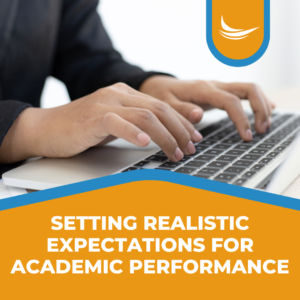Setting Realistic Expectations for Academic Performance
 In the realm of education, the desire for success is a common thread that weaves through the lives of students, parents, and educators alike. However, the pursuit of academic excellence must be tempered with the understanding that each student’s journey is unique. Setting realistic expectations for academic performance is crucial for fostering a healthy learning environment that nurtures growth, resilience, and well-being.
In the realm of education, the desire for success is a common thread that weaves through the lives of students, parents, and educators alike. However, the pursuit of academic excellence must be tempered with the understanding that each student’s journey is unique. Setting realistic expectations for academic performance is crucial for fostering a healthy learning environment that nurtures growth, resilience, and well-being.
The Pitfalls of Unrealistic Expectations
While ambition is a driving force, setting expectations that are too lofty can lead to detrimental consequences. Unrealistic expectations can create excessive pressure on students, contributing to stress, burnout, and even mental health issues. The fear of failure can become paralyzing, hindering the learning process and stifling creativity. Additionally, constant pursuit of perfection may undermine the joy of learning, turning education into a mere checklist of accomplishments.
- Embrace Individuality and Diverse Pathways
Every student is a unique individual with their own strengths, weaknesses, interests, and pace of learning. Recognizing and celebrating this diversity is essential in setting realistic expectations. Encourage your child to explore their passions and strengths, rather than forcing them down a predetermined path. Success can take various forms and is not solely defined by grades; it’s also about personal growth, resilience, and the development of critical skills.
- Focus on Effort and Progress
Instead of fixating solely on outcomes, emphasize the value of effort and progress. Instill in your child the understanding that success is a journey that requires consistent dedication and hard work. Celebrate the incremental improvements they make along the way. This mindset shift cultivates resilience, as students learn to view setbacks as opportunities to learn and grow.
- Promote a Growth Mindset
Encourage your child to adopt a growth mindset—a belief that abilities and intelligence can be developed through effort, practice, and learning from mistakes. A growth mindset fosters resilience and a positive attitude toward challenges. By understanding that failure is not a dead-end, but a stepping stone, students are more likely to persevere through difficulties and pursue excellence with a healthier perspective.
- Communicate and Collaborate
Open lines of communication between parents, educators, and students are vital in setting realistic expectations. Collaboratively define goals and milestones that align with the student’s abilities and aspirations. This ensures that everyone is on the same page and working toward a shared vision. Regular check-ins allow for adjustments as needed and provide opportunities to address concerns promptly.
- Set Goals with Flexibility
Goals provide direction and motivation, but they should be approached with flexibility. Encourage your child to set both short-term and long-term goals that are specific, measurable, achievable, relevant, and time-bound (SMART). However, stress that these goals are not set in stone and can be adjusted as circumstances change. This flexibility helps in adapting to unforeseen challenges and opportunities.
- Celebrate Achievements, Big and Small
Acknowledging achievements, no matter how small, is essential in building confidence and a positive self-image. Recognize the effort put into completing assignments, projects, or exams. Celebrate not only high grades but also the courage to tackle difficult subjects and the persistence to overcome obstacles.
- Encourage Well-Being
In the pursuit of academic success, well-being should never be compromised. Stress the importance of maintaining a healthy work-life balance. Encourage regular breaks, physical activity, hobbies, and social interactions. A healthy mind and body are essential for optimal learning and sustained achievement.
- Lead by Example
Parents and educators play a pivotal role in shaping a student’s perspective on success. Lead by example by demonstrating a balanced approach to work, learning, and personal life. Share your own experiences of setbacks and successes, highlighting the importance of resilience, adaptability, and continuous growth.
Finding the right balance between ambition and realism in academic performance is an ongoing journey that requires thoughtful consideration and continuous communication. The goal is not to curb aspirations but to cultivate a healthy approach to learning and growth. By embracing individuality, focusing on effort and progress, promoting a growth mindset, and maintaining open lines of communication, students can thrive in an environment that supports their well-being and empowers them to achieve their full potential. Remember, success is not a race; it’s a personal journey of discovery, growth, and transformation.



























